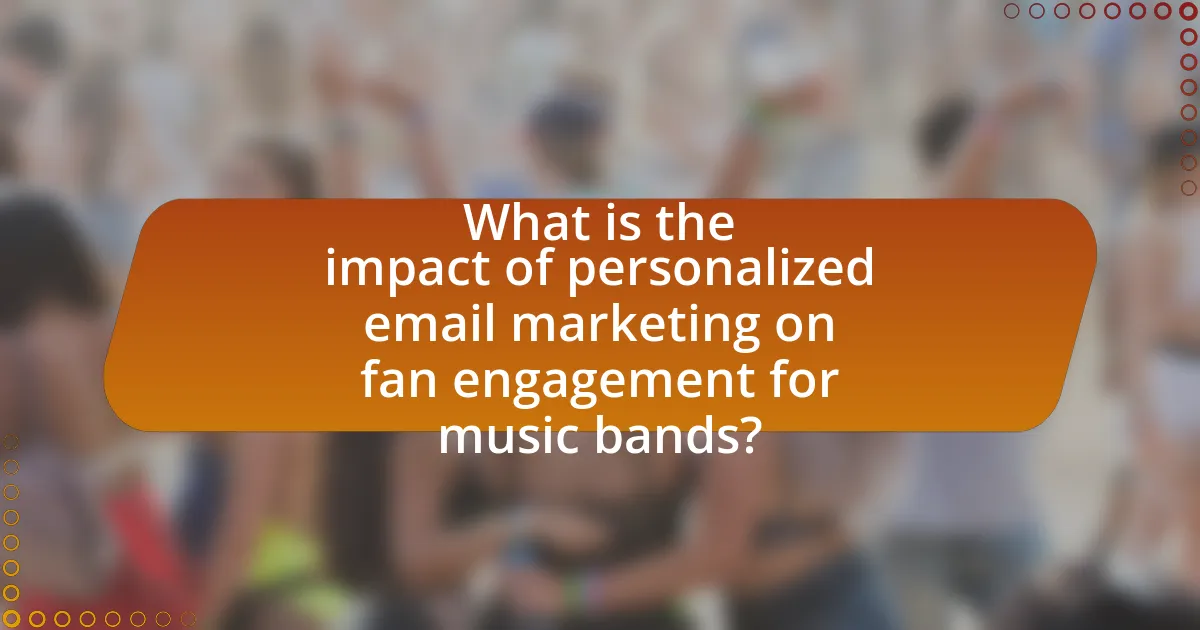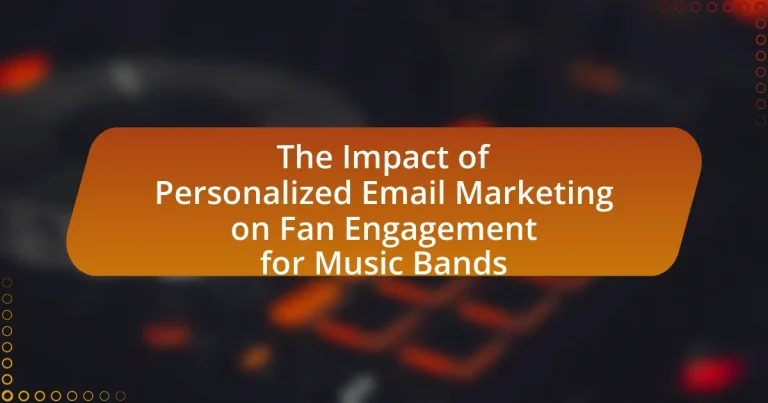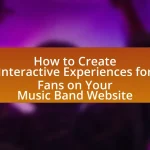The article examines the impact of personalized email marketing on fan engagement for music bands. It highlights how tailored communication enhances open and click-through rates, fostering a deeper connection between bands and their audiences. Key strategies such as segmentation, dynamic content, and behavioral targeting are discussed, along with their effects on fan loyalty and interaction. The article also addresses the importance of data in creating effective campaigns, the challenges bands face in implementation, and best practices for maximizing engagement through personalized content.

What is the impact of personalized email marketing on fan engagement for music bands?
Personalized email marketing significantly enhances fan engagement for music bands by creating tailored communication that resonates with individual preferences. This approach leads to higher open rates, with studies indicating that personalized emails can achieve open rates of up to 29% compared to 20% for non-personalized emails. Additionally, personalized content fosters a sense of connection, encouraging fans to participate in events and promotions, which can increase attendance at concerts and merchandise sales. Research from Campaign Monitor shows that segmented campaigns, which often include personalized elements, can lead to a 760% increase in revenue. Thus, personalized email marketing effectively drives deeper engagement and loyalty among fans of music bands.
How does personalized email marketing enhance fan engagement?
Personalized email marketing enhances fan engagement by delivering tailored content that resonates with individual preferences and behaviors. This targeted approach increases open rates and click-through rates, as fans are more likely to engage with messages that reflect their interests. For instance, a study by Campaign Monitor found that personalized emails can generate up to six times higher transaction rates compared to non-personalized emails. By utilizing data such as past purchases, concert attendance, and music preferences, bands can create relevant and compelling communications that foster a deeper connection with their audience.
What specific strategies are used in personalized email marketing?
Personalized email marketing employs several specific strategies to enhance engagement, including segmentation, dynamic content, and behavioral targeting. Segmentation involves dividing the email list into distinct groups based on demographics, preferences, or past interactions, allowing for tailored messaging that resonates with each group. Dynamic content enables marketers to customize email elements, such as images or offers, based on individual recipient data, ensuring relevance and increasing the likelihood of engagement. Behavioral targeting utilizes data on user actions, such as previous purchases or website visits, to send timely and relevant emails that encourage further interaction. These strategies are supported by research indicating that personalized emails can lead to a 29% higher open rate and a 41% higher click-through rate compared to non-personalized emails, demonstrating their effectiveness in engaging audiences.
How do these strategies affect fan loyalty and interaction?
Personalized email marketing strategies significantly enhance fan loyalty and interaction by creating tailored experiences that resonate with individual preferences. When music bands utilize personalized content, such as customized recommendations and exclusive offers, fans feel a deeper connection to the band, leading to increased engagement. Research indicates that personalized emails can achieve a 29% higher open rate and a 41% higher click-through rate compared to non-personalized emails, demonstrating that fans are more likely to interact with content that speaks directly to their interests. This heightened interaction fosters a sense of belonging and loyalty, as fans perceive the band as attentive to their needs and preferences.
Why is personalized email marketing important for music bands?
Personalized email marketing is important for music bands because it significantly enhances fan engagement and loyalty. By tailoring content to individual preferences, bands can create a more meaningful connection with their audience, leading to higher open and click-through rates. Research indicates that personalized emails can increase engagement by up to 29%, as fans are more likely to respond to messages that resonate with their specific interests and behaviors. This targeted approach not only fosters a sense of community but also drives ticket sales and merchandise purchases, ultimately contributing to the band’s overall success.
What role does personalization play in fan retention?
Personalization significantly enhances fan retention by creating tailored experiences that resonate with individual preferences. When music bands utilize personalized email marketing, they can deliver content that aligns with fans’ specific interests, such as concert announcements, merchandise offers, or exclusive content. Research indicates that personalized marketing can lead to a 20% increase in customer engagement, as fans feel more valued and connected to the band. This connection fosters loyalty, encouraging fans to remain engaged over time, ultimately resulting in higher retention rates.
How does personalized content influence fan behavior?
Personalized content significantly influences fan behavior by enhancing engagement and loyalty. When fans receive tailored messages that reflect their preferences and interests, they are more likely to interact with the content, attend events, and make purchases. Research indicates that personalized marketing can lead to a 20% increase in sales and a 50% increase in engagement rates, as fans feel a stronger connection to the brand. This connection is further supported by data showing that 72% of consumers only engage with marketing messages that are customized to their interests, demonstrating the effectiveness of personalized content in driving fan behavior.
What are the key components of effective personalized email marketing?
The key components of effective personalized email marketing include segmentation, tailored content, dynamic subject lines, and behavioral triggers. Segmentation allows marketers to categorize their audience based on demographics, preferences, and past interactions, which increases relevance. Tailored content ensures that the message resonates with the individual recipient, enhancing engagement. Dynamic subject lines capture attention by reflecting the recipient’s interests or recent activities. Behavioral triggers, such as sending emails based on user actions (like website visits or previous purchases), prompt timely and relevant communication. According to a study by Campaign Monitor, personalized emails can deliver six times higher transaction rates compared to non-personalized emails, demonstrating the effectiveness of these components in driving engagement.
What data is essential for creating personalized email campaigns?
Essential data for creating personalized email campaigns includes subscriber demographics, past purchase behavior, engagement history, and preferences. Subscriber demographics, such as age, location, and gender, help tailor content to specific audience segments. Past purchase behavior provides insights into what products or services the subscriber is interested in, allowing for targeted promotions. Engagement history, including open rates and click-through rates, indicates how subscribers interact with previous emails, guiding future content strategies. Lastly, preferences, such as music genre or event types, enable customization that resonates with individual interests. Collectively, this data enhances the relevance and effectiveness of email campaigns, leading to improved fan engagement for music bands.
How can music bands segment their audience for better targeting?
Music bands can segment their audience for better targeting by analyzing demographic data, behavioral patterns, and engagement levels. By utilizing tools like surveys and analytics, bands can categorize fans based on age, location, music preferences, and past concert attendance. For instance, a study by Nielsen Music indicates that 70% of music listeners prefer personalized content, which suggests that targeted marketing efforts can significantly enhance fan engagement. This segmentation allows bands to tailor their email marketing campaigns, ensuring that messages resonate with specific audience groups, thereby increasing the likelihood of ticket sales and merchandise purchases.
How can music bands measure the success of personalized email marketing?
Music bands can measure the success of personalized email marketing through key performance indicators (KPIs) such as open rates, click-through rates, conversion rates, and subscriber engagement metrics. Open rates indicate how many recipients opened the email, reflecting the effectiveness of subject lines and personalization. Click-through rates show the percentage of recipients who clicked on links within the email, demonstrating the content’s relevance and appeal. Conversion rates measure the percentage of recipients who completed a desired action, such as purchasing tickets or merchandise, directly linked to the email campaign. Additionally, tracking subscriber engagement metrics, such as responses and social media shares, provides insights into how well the content resonates with fans. According to a study by Mailchimp, personalized emails can lead to a 26% increase in revenue, highlighting the tangible benefits of effective email marketing strategies for music bands.
What metrics should be tracked to evaluate fan engagement?
To evaluate fan engagement, metrics such as open rates, click-through rates, conversion rates, and social media interactions should be tracked. Open rates indicate how many fans are engaging with email content, while click-through rates measure the effectiveness of calls to action within those emails. Conversion rates reflect the percentage of fans taking desired actions, such as purchasing tickets or merchandise. Social media interactions, including likes, shares, and comments, provide insights into fan sentiment and engagement levels. These metrics collectively offer a comprehensive view of how effectively a music band is connecting with its audience through personalized email marketing.
How can feedback be utilized to improve email marketing strategies?
Feedback can be utilized to improve email marketing strategies by analyzing recipient responses to tailor content more effectively. For instance, tracking open rates, click-through rates, and unsubscribe rates provides insights into what resonates with the audience. According to a study by HubSpot, personalized emails can increase click-through rates by 14% and conversion rates by 10%. By implementing feedback mechanisms such as surveys or A/B testing, marketers can refine their messaging, segment their audience, and enhance overall engagement, leading to more successful campaigns.
What challenges do music bands face in implementing personalized email marketing?
Music bands face several challenges in implementing personalized email marketing, primarily due to limited resources, data management issues, and audience segmentation difficulties. Limited resources often hinder bands from investing in sophisticated email marketing tools or hiring experts to create tailored content. Data management issues arise when bands struggle to collect, analyze, and utilize fan data effectively, leading to generic messaging rather than personalized communication. Additionally, audience segmentation difficulties make it challenging for bands to identify and target specific fan groups based on their preferences and behaviors, which is essential for effective personalized marketing. These challenges can significantly impact the effectiveness of email campaigns and overall fan engagement.
How can bands overcome data privacy concerns?
Bands can overcome data privacy concerns by implementing transparent data collection practices and ensuring compliance with regulations such as GDPR. By clearly communicating to fans how their data will be used and obtaining explicit consent, bands can build trust. Additionally, utilizing secure data storage solutions and regularly updating privacy policies can further protect fan information. According to a 2021 survey by the International Association of Privacy Professionals, 79% of consumers are more likely to engage with brands that prioritize data privacy, highlighting the importance of these practices in enhancing fan engagement.
What are common pitfalls in personalized email marketing campaigns?
Common pitfalls in personalized email marketing campaigns include over-segmentation, lack of relevant content, and neglecting mobile optimization. Over-segmentation can lead to fragmented messaging that confuses recipients, while lack of relevant content results in disengagement, as 70% of consumers prefer personalized experiences. Additionally, neglecting mobile optimization can significantly reduce engagement, given that over 50% of emails are opened on mobile devices. These pitfalls can undermine the effectiveness of campaigns aimed at enhancing fan engagement for music bands.
What best practices should music bands follow for personalized email marketing?
Music bands should segment their email lists based on fan preferences and behaviors to enhance personalized email marketing. By categorizing fans into groups such as concert-goers, merchandise buyers, or genre enthusiasts, bands can tailor their content to meet specific interests. Research indicates that segmented email campaigns can lead to a 760% increase in revenue, demonstrating the effectiveness of targeted messaging. Additionally, using the recipient’s name in the subject line and body of the email can increase open rates by 26%, further emphasizing the importance of personalization. Engaging fans with exclusive content, such as behind-the-scenes footage or early access to tickets, also fosters a deeper connection and encourages loyalty.
How can bands create compelling content for their emails?
Bands can create compelling content for their emails by personalizing messages to resonate with their audience. Personalization can include addressing fans by their names, segmenting the audience based on their preferences, and tailoring content to reflect the fans’ interests, such as exclusive updates on new music, concert announcements, or behind-the-scenes insights. Research shows that personalized emails can lead to a 29% higher open rate and a 41% higher click-through rate, demonstrating the effectiveness of this approach in engaging fans. By incorporating these strategies, bands can enhance their connection with fans and increase overall engagement.
What frequency of emails is optimal for maintaining fan engagement?
The optimal frequency of emails for maintaining fan engagement is typically between one to four emails per month. Research indicates that sending emails within this range helps to keep fans informed and engaged without overwhelming them. A study by HubSpot found that brands that send 1-4 emails per month experience higher open rates and engagement compared to those that send emails more frequently or less often. This frequency strikes a balance, allowing music bands to share updates, promotions, and personalized content effectively while maintaining fan interest and avoiding email fatigue.
What tools and platforms can assist music bands in personalized email marketing?
Music bands can utilize tools and platforms such as Mailchimp, Constant Contact, and Sendinblue for personalized email marketing. Mailchimp offers advanced segmentation features, allowing bands to tailor messages based on fan behavior and preferences, which can lead to higher engagement rates. Constant Contact provides customizable templates and automation options that help bands maintain consistent communication with their audience. Sendinblue combines email marketing with SMS campaigns, enabling bands to reach fans through multiple channels, enhancing overall engagement. These platforms are widely recognized in the industry for their effectiveness in improving fan interaction through targeted email strategies.
Which email marketing software is best suited for music bands?
Mailchimp is the best-suited email marketing software for music bands. It offers user-friendly templates, automation features, and robust analytics that help bands effectively engage with their fans. Mailchimp’s segmentation capabilities allow bands to tailor their messages based on fan preferences and behaviors, enhancing personalization. According to a 2021 report by Statista, email marketing has an average ROI of 42:1, demonstrating its effectiveness in reaching audiences, which is crucial for music bands looking to maintain and grow their fan base.
How can automation enhance personalized email marketing efforts?
Automation can enhance personalized email marketing efforts by enabling the segmentation of audiences and the delivery of tailored content at scale. This technology allows marketers to analyze user behavior and preferences, facilitating the creation of targeted campaigns that resonate with specific segments. For instance, according to a study by Campaign Monitor, personalized emails can generate six times higher transaction rates compared to non-personalized emails. By automating the process of data collection and analysis, music bands can efficiently engage fans with relevant updates, concert announcements, and merchandise offers, ultimately increasing fan loyalty and engagement.
What are the future trends in personalized email marketing for music bands?
Future trends in personalized email marketing for music bands include increased use of AI-driven analytics, enhanced segmentation strategies, and interactive content. AI-driven analytics will enable bands to analyze fan behavior and preferences more accurately, allowing for tailored messaging that resonates with individual fans. Enhanced segmentation strategies will allow bands to categorize their audience based on various factors such as location, listening habits, and engagement levels, leading to more relevant content delivery. Interactive content, such as polls and quizzes, will engage fans more deeply, fostering a sense of community and encouraging higher open and click-through rates. These trends are supported by industry reports indicating that personalized emails can generate six times higher transaction rates compared to non-personalized emails.
How will advancements in technology shape email marketing strategies?
Advancements in technology will significantly shape email marketing strategies by enabling greater personalization and automation. Enhanced data analytics tools allow marketers to gather and analyze consumer behavior, leading to tailored content that resonates with individual preferences. For instance, machine learning algorithms can predict user interests based on past interactions, resulting in more relevant email campaigns. According to a study by Epsilon, personalized emails can generate up to six times higher transaction rates compared to non-personalized ones. Additionally, automation tools streamline the process of sending targeted emails at optimal times, increasing engagement rates. These technological advancements ultimately lead to more effective email marketing strategies that foster deeper connections between music bands and their fans.
What emerging practices should bands be aware of to stay relevant?
Bands should be aware of personalized email marketing as an emerging practice to stay relevant. This approach allows bands to engage directly with their fans by sending tailored content, such as exclusive updates, concert announcements, and personalized messages based on fan preferences. Research indicates that personalized emails can increase engagement rates by up to 29%, as they resonate more with recipients compared to generic communications. By leveraging data analytics to segment their audience and customize their messaging, bands can foster a deeper connection with fans, ultimately enhancing loyalty and driving ticket sales.
What practical tips can music bands implement for effective personalized email marketing?
Music bands can implement effective personalized email marketing by segmenting their audience based on preferences and behaviors. This allows bands to tailor content, such as concert announcements or merchandise offers, to specific groups, increasing engagement rates. For instance, a study by Mailchimp found that segmented campaigns can lead to a 14.31% higher open rate compared to non-segmented campaigns. Additionally, using the recipient’s name in the subject line and body of the email can enhance personalization, as emails with personalized subject lines have been shown to have 26% higher open rates. Lastly, incorporating user-generated content, such as fan photos or testimonials, can foster a sense of community and encourage further interaction, as highlighted by research from HubSpot, which indicates that personalized content can significantly boost engagement.


